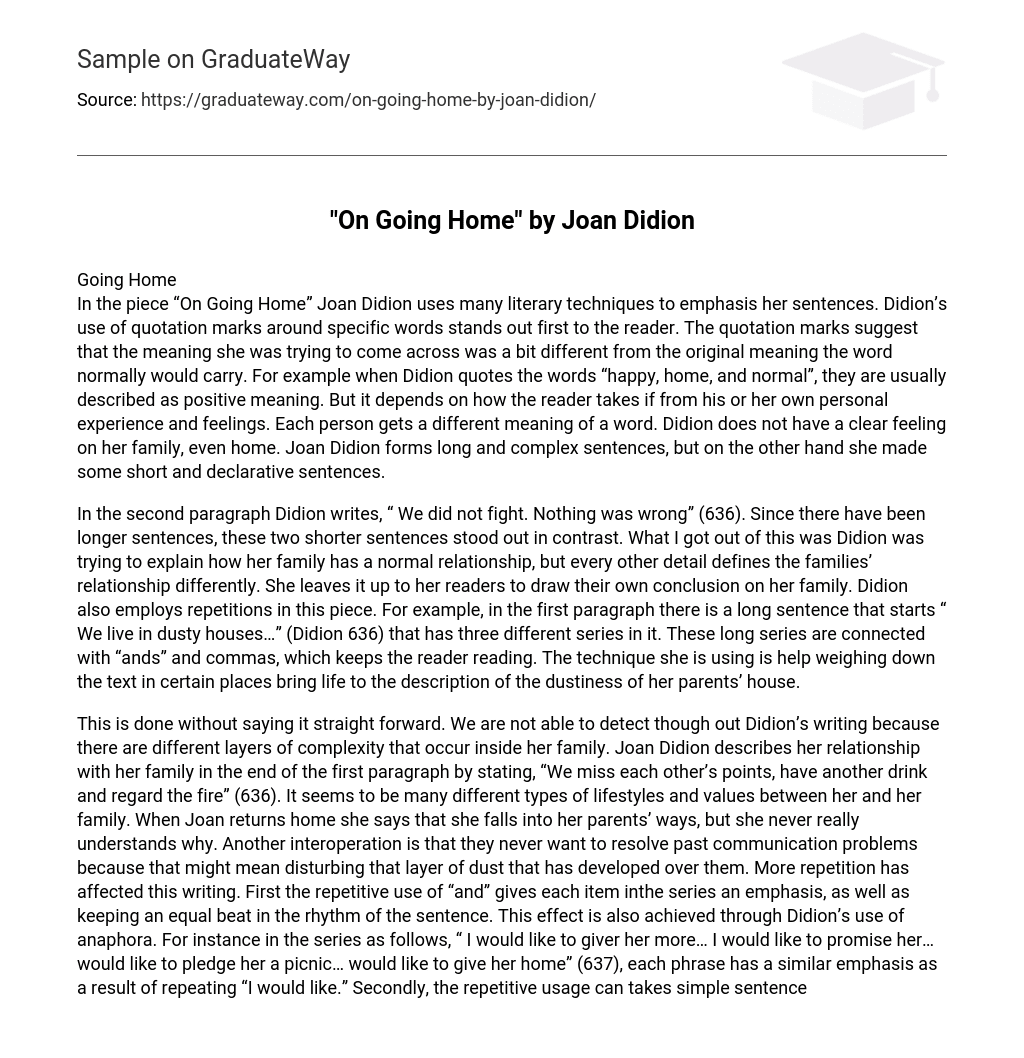Going Home
In the piece “On Going Home” Joan Didion uses many literary techniques to emphasis her sentences. Didion’s use of quotation marks around specific words stands out first to the reader. The quotation marks suggest that the meaning she was trying to come across was a bit different from the original meaning the word normally would carry. For example when Didion quotes the words “happy, home, and normal”, they are usually described as positive meaning. But it depends on how the reader takes if from his or her own personal experience and feelings. Each person gets a different meaning of a word. Didion does not have a clear feeling on her family, even home. Joan Didion forms long and complex sentences, but on the other hand she made some short and declarative sentences.
In the second paragraph Didion writes, “ We did not fight. Nothing was wrong” (636). Since there have been longer sentences, these two shorter sentences stood out in contrast. What I got out of this was Didion was trying to explain how her family has a normal relationship, but every other detail defines the families’ relationship differently. She leaves it up to her readers to draw their own conclusion on her family. Didion also employs repetitions in this piece. For example, in the first paragraph there is a long sentence that starts “ We live in dusty houses…” (Didion 636) that has three different series in it. These long series are connected with “ands” and commas, which keeps the reader reading. The technique she is using is help weighing down the text in certain places bring life to the description of the dustiness of her parents’ house.
This is done without saying it straight forward. We are not able to detect though out Didion’s writing because there are different layers of complexity that occur inside her family. Joan Didion describes her relationship with her family in the end of the first paragraph by stating, “We miss each other’s points, have another drink and regard the fire” (636). It seems to be many different types of lifestyles and values between her and her family. When Joan returns home she says that she falls into her parents’ ways, but she never really understands why. Another interoperation is that they never want to resolve past communication problems because that might mean disturbing that layer of dust that has developed over them. More repetition has affected this writing. First the repetitive use of “and” gives each item inthe series an emphasis, as well as keeping an equal beat in the rhythm of the sentence. This effect is also achieved through Didion’s use of anaphora. For instance in the series as follows, “ I would like to giver her more… I would like to promise her… would like to pledge her a picnic… would like to give her home” (637), each phrase has a similar emphasis as a result of repeating “I would like.” Secondly, the repetitive usage can takes simple sentences and interrupts them.
Every conjunction and comma gives the simple sentence more than one meaning. Another technique Didion uses in this story was the use of long and compound words, which are particularly grouped together. For example when Didion uses phrases such as “neurotic lassitude engendered” (636), and “oblique, deliberately inarticulate” (636) illustrates the difficulties of her feelings. If she stated these words more clear throughout the reading, the reader might have gotten the same feelings that Didion felt. When describing “neurotic lassitude engendered,” Didion’s feelings are difficult and the more difficult the words she uses add more importance to her feelings. Long, compound words may not be as clear in the meanings as short simpler words. Didion used these long, compound words because her work is not boring and dried up. She keeps the reader interested. The setting of this story takes place in Central Valley of California, with Joan Didions’ family. She describes how her house is completely different from her parents because her house is dirty.
For instance when Didion writes, “We live in dusty houses (“D-U-S-T,” he once wrote with his finger on surfaces all over the house, but no one noticed it)” (636). From a readers point of view this is disgusting. A clean house reflects on the family’s life style. When seeing a dirty house, I never want to touch anything and leave. The tone of Joan Didion in this passage is confusing. She states in the end of the first paragraph “We miss each other’s points, have another drink and regard the fire” (636). From reading this I interpretation it as they all miss each other, but too much time together can be too much. For example around my own family is so much from, but if we are together for more than a week we will kill each other.
Work Cited
Didion, Joan. “On Going Home” Literature for Compostition An Introduction to
Literature. S. Barnet, W. Burto, and W. Cain. The Library of Congress. 636-637.





